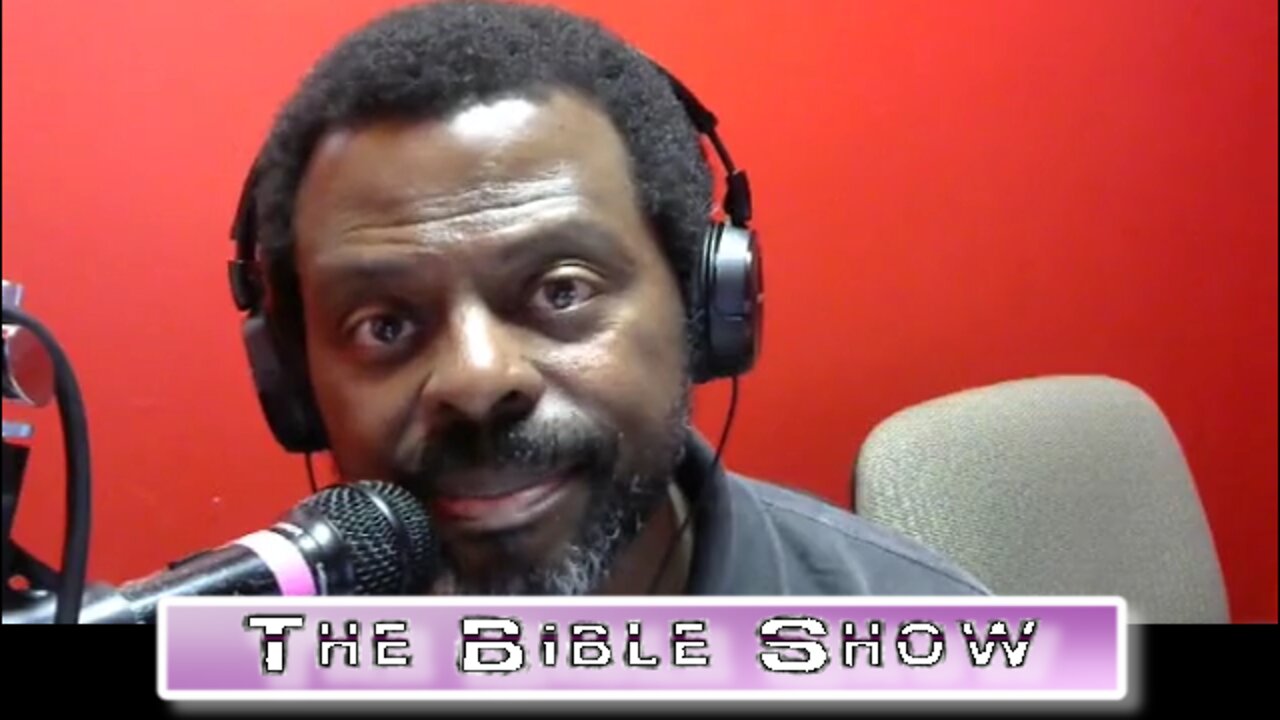Premium Only Content

Lesson 19: The Council of Trent 090519
EvolutionPOP.com
The Bible Show
09/05/2019
Lesson 19: The Council of Trent 090519
01.) Amos 3:1-2 (You only have I known, Israel).
02.) Romans 3:1-2 (Oracles of God committed to Israel).
03.) John 4:5-10, 19-26 (Salvation is of the Jews; Jesus is the Messiah)
04.) Exodus 19:5 (Peculiar treasure unto me)
05.) Deuteronomy 14:2 (Thou art an holy people)
06.) Deuteronomy 26:18 (His peculiar people)
07.) Psalms 135:4 (His peculiar treasure)
TheGospelCoalition.org
9 Things You Should Know About the Council of Trent
https://www.thegospelcoalition.org/article/9-things-you-should-know-about-the-council-of-trent/
1. The Council of Trent was the most important movement of the Catholic Counter-Reformation, the Catholic Church’s first significant reply to the growing Protestants Reformation. The primary purpose of the council was to condemn and refute the beliefs of the Protestants, such as Martin Luther and John Calvin, and also to make the set of beliefs in Catholicism even clearer. Approximately forty clergymen, mainly Catholic bishops, were in attendance during the twenty-five times over the next eighteen years that the Council convened.
NewAdvent.org
http://www.newadvent.org/cathen/15030c.htm
The nineteenth ecumenical council opened at Trent on 13 December, 1545, and closed there on 4 December, 1563. Its main object was the definitive determination of the doctrines of the Church in answer to the heresies of the Protestants; a further object was the execution of a thorough reform of the inner life of the Church by removing the numerous abuses that had developed in it.
SabbathTruth.com
The Council of Trent
https://www.sabbathtruth.com/sabbath-history/the-council-of-trent
The Reformers had constantly charged ... that the Catholic Church had apostatized from the truth as contained in the written word. "The written word," "The Bible and the Bible only," "Thus saith the Lord," these were their constant watchwords; and "The Scripture, as in the written word, the sole standard of appeal," this was the proclaimed platform of the Reformation and of Protestantism.
"The Scripture and tradition." "The Bible as interpreted by the Church and according to the unanimous consent of the Father," this was the position and claim of the Catholic Church. This was the main issue in the Council of Trent, which was called, especially to consider the questions that had been raised and forced upon the attention of Europe by the Reformers. The very first question concerning faith that was considered by the council was the question involved in this issue.
The Archbishop of Reggio
Finally, after a long and intensive mental strain, the Archbishop of Reggio came into the council with substantially the following argument to the party who held for Scripture alone: "The Protestants claim to stand upon the written word only. They profess to hold the Scripture alone as the standard of faith. They justify their revolt by the plea that the Church has apostatized from the written word and follows tradition. Now the Protestants' claim, that they stand upon the written word only, is not true. Their profession of holding the Scripture alone as the standard of faith, is false.
PROOF: The written word explicitly enjoins the observance of the seventh day as the Sabbath. They do not observe the seventh day, but reject it. If they do truly hold the Scripture alone as their standard, they would be observing the seventh day as is enjoined in the Scripture throughout. Yet they not only reject the observance of the Sabbath enjoined in the written word, but they have adopted and do practice the observance of Sunday, for which they have only the tradition of the Church. Consequently, the claim of 'Scripture alone as the standard,' fails; and the doctrine of 'Scripture and tradition' as essential, is fully established, the Protestants themselves being judges."
The argument was hailed in the council as of Inspiration only; the party for "Scripture alone," surrendered; and the council at once unanimously condemned Protestantism and the whole Reformation as only an unwarranted revolt from the communion and authority of the Catholic Church; and proceeded, April 8, 1546, "to the promulgation of two decrees, the first of which enacts, under anathema, that Scripture and tradition are to be received and venerated equally, and that the deutero-canonical [the apocryphal] books are part of the canon of Scripture.
08.) Colossians 2:8 (Tradition of men)
09.) Titus 1:10-16 (Commandments of men turn from the truth)
SafeGuarrdYourSoul.com
Why Did the 1611 KJV Include the Apocrypha?
http://safeguardyoursoul.com/why-did-the-1611-kjv-include-the-apocrypha/
QUESTION: Didn’t the King James Bible when first printed contain the Apocrypha?
ANSWER: Yes.
EXPLANATION: Many critics of the perfect Bible like to point out that the original King James had the Apocrypha in it as though that fact compromises its integrity. But several things must be examined to get the factual picture.
First, in the days in which our Bible was translated, the Apocrypha was accepted reading based on its historical value, though not accepted as Scripture by anyone outside of the Catholic church. The King James translators therefore placed it between the Old and New Testaments for its historical benefit to its readers. They did not integrate it into the Old Testament text as do the corrupt Alexandrian manuscripts.
That they rejected the Apocrypha as divine is very obvious by the seven reasons which they gave for not incorporating it into the text. They are as follows:
1. Not one of them is in the Hebrew language, which was alone used by the inspired historians and poets of the Old Testament.
2. Not one of the writers lays any claim to inspiration.
3. These books were never acknowledged as sacred Scriptures by the Jewish Church, and therefore were never sanctioned by our Lord.
4. They were not allowed a place among the sacred books, during the first four centuries of the Christian Church.
5. They contain fabulous statements, and statements which contradict not only the canonical Scriptures, but themselves; as when, in the two Books of Maccabees, Antiochus Epiphanes is made to die three different deaths in as many different places.
6. It inculcates doctrines at variance with the Bible, such as prayers for the dead and sinless perfection.
7. It teaches immoral practices, such as lying, suicide, assassination and magical incantation.
RockinGodsHouse.com
Why Were 14 Books (Apocrypha) Removed from the Bible?
http://www.rockingodshouse.com/why-were-14-books-apocrypha-removed-from-the-bible-in-1881/index.html
In 1881, due to the influence of wildly liberal textual critics, Westcott and Hort, the Apocrypha was removed from non- Catholic Bibles. The Catholics ignored Westcott and Hort, but the Protestants and the Anglicans fell into line, and when the influence of the popular textual critics said, “Well, this should not be in the Bible,” amazingly, everybody just fell like dominoes. And starting in 1881, Bibles that are Protestant or Anglican don’t have the Apocrypha.
WhatChristiansWantToKnow.com
Books of The Bible: Complete List With Authors
https://www.whatchristianswanttoknow.com/books-of-the-bible-complete-list-with-authors/
Pentateuch
These are the books of the Law. These are also called the Books of Moses. This includes the first five books:
Genesis, written by Moses
Exodus, written by Moses
Leviticus, written by Moses
Numbers, written by Moses
Deuteronomy, written by Moses
The Books of History
The Books of history are so named because they contain historical records and these books include:
Joshua, written by Joshua (except the parts relating to his death)
Judges, written by Samuel, Nathan, Gad
Ruth, written by Samuel, Nathan, Gad
1 Samuel, written by Samuel, Nathan, Gad
2 Samuel, written by Samuel, Nathan, Gad
1 Kings, written by Jeremiah
2 Kings, written by Jeremiah
1 Chronicles, written by Ezra
2 Chronicles, written by Ezra
Ezra, written by Ezra
Nehemiah, written by Nehemiah, Ezra
Esther, written by Mordecai: It is probable that the book was compiled after his death based on his personal records
The Books Poetry
Also called the books of Writings include the following books:
Job, written by Job: Moses may have compiled the book based on Job’s records
Psalms, written by David, and several others including Asaph, Ezra, the sons of Korah, Heman, Ethan, Moses and a host of unnamed authors
Proverbs, written by Solomon: Agur and Lemuel are specifically named as the writers of Proverbs 30 and 31
Ecclesiastes, written by Solomon
Song of Solomon (also known as, Song of Songs or Canticles), written by Solomon: though this is debated
Major Prophets
The Major Prophets are so named because their books are longer, not because they are more important.
Isaiah, written by Isaiah
Jeremiah, written by Jeremiah
Lamentations, written by Jeremiah
Ezekiel, written by Ezekiel
Daniel, written by Daniel
Minor Prophets
The Minor Prophets are so named because they are shorter not because they are less important.
Hosea, written by Hosea
Joel, written by Joel
Amos, written by Amos
Obadiah, written by Obadiah
Jonah, written by Jonah
Micah, written by Micah
Nahum, written by Nahum
Habakkuk, written by Habakkuk
Zephaniah, written by Zephaniah
Haggai, written by Haggai
Zechariah, written by Zechariah
Malachi, written by Malachi
New Testament
The New Testament is also divided into groups. All of these books were written in the first century AD.
Gospels
Matthew, written by Matthew
Mark, written by John Mark
Luke, written by Luke
John, written by John, the Apostle
History
Acts, written by Luke
Pauline Epistles
Romans, written by Paul
1 Corinthians, written by Paul
2 Corinthians, written by Paul
Galatians, written by Paul
Ephesians, written by Paul
Philippians, written by Paul
Colossians, written by Paul
1 Thessalonians, written by Paul
2 Thessalonians, written by Paul
1 Timothy, written by Paul
2 Timothy, written by Paul
Titus, written by Paul
Philemon, written by Paul
General Epistles
Hebrews, written by Paul, Luke, Barnabas, Apollos
James, written by James: there are several men named James who could have been the author. Most scholars say this is James the brother of Jesus and Jude (not the Apostle, brother of John).
1 Peter, written by Peter
2 Peter, written by Peter
1 John, written by John, the Apostle
2 John, written by John, the Apostle
3 John, written by John, the Apostle
Jude, written by Jude, the brother of Jesus and James, not the Apostle (Jude 17)
Prophecy
Revelation, written by John, the Apostle
08.) 2 Timothy 3:14-17 (All scripture is given by inspiration of God)
09.)Proverbs 1:1-9 (Fools despise wisdom, knowledge, and instruction)
10.) 2 Peter 1:15-21 (A more sure word of prophecy)
HelpMeWithBibleStudy.org
http://helpmewithbiblestudy.org/5system_moses/notes/dh12_joshua.aspx
Who Wrote the Book of Joshua?
While most of Joshua was authored by Joshua, the post Joshua events indicate that there was some additional material added by a later person such as the priests Eleazar or his son Phinehas. This editing was most certainly done before the Exile.
JD Hudson YouTube Channel:
https://www.youtube.com/channel/UCXEPe-7cWv7LnI8WFqN44Ig
-
 LIVE
LIVE
Dr Disrespect
6 hours ago🔴LIVE - DR DISRESPECT - PUBG - PRO TACTICALLY WINNING
4,833 watching -
 1:02:40
1:02:40
In The Litter Box w/ Jewels & Catturd
21 hours agoUSAID to Staff: Shred and Burn | In the Litter Box w/ Jewels & Catturd – Ep. 760 – 3/12/2025
38.4K12 -
 2:21:38
2:21:38
Darkhorse Podcast
4 hours agoThe 267th Evolutionary Lens with Bret Weinstein and Heather Heying
27.1K21 -
 1:58:45
1:58:45
The Quartering
5 hours agoCorrupt Democrats Caught SHREDDING Evidence, Assassination Plot On Alex Jones, Tariff Fallout & More
91.5K38 -
 1:27:14
1:27:14
The Officer Tatum
4 hours agoLIVE: Trump and Elon BREAK INTERNET With BRAND NEW TESLA | Officer Tatum Show EP 78
29K26 -
 2:10:41
2:10:41
Adam Carolla
1 day agoCatalytic Converter Theft Turns Deadly + UPDATE! Rebuilding Malibu | Adam’s Wild Malibu Trip
16.2K9 -
 47:43
47:43
Russell Brand
6 hours agoWho’s Controlling the Narrative? Iran, Epstein, and the Fight Over Women’s Sports – SF552
139K83 -
 1:54:25
1:54:25
vivafrei
7 hours agoCanadian Premiers BUCKLE! "Gender" Wars in Congress! Madness in Seattle AND MORE! Viva Frei Live
88.2K94 -
 1:58:28
1:58:28
The Charlie Kirk Show
5 hours agoWhy The Left Hates Musk + Punishing Campus Antisemitism | Terrell | 3.12.25
103K23 -
 1:33:23
1:33:23
Simply Bitcoin
5 hours ago $3.15 earnedPlan To Buy 1M Bitcoin is BACK With A HUGE TWIST!! | EP 1201
52.6K1